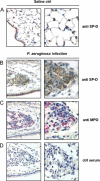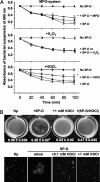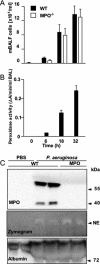Myeloperoxidase-dependent inactivation of surfactant protein D in vitro and in vivo
- PMID: 20228064
- PMCID: PMC2878025
- DOI: 10.1074/jbc.M109.097048
Myeloperoxidase-dependent inactivation of surfactant protein D in vitro and in vivo
Abstract
Surfactant protein D (SP-D) plays diverse and important roles in innate immunity and pulmonary homeostasis. Neutrophils and myeloperoxidase (MPO) colocalized with SP-D in a murine bacterial pneumonia model of acute inflammation, suggesting that MPO-derived reactive species might alter the function of SP-D. Exposure of SP-D to the complete MPO-H(2)O(2)-halide system caused loss of SP-D-dependent aggregating activity. Hypochlorous acid (HOCl), the major oxidant generated by MPO, caused a similar loss of aggregating activity, which was accompanied by the generation of abnormal disulfide-cross-linked oligomers. A full-length SP-D mutant lacking N-terminal cysteine residues and truncation mutants lacking the N-terminal domains were resistant to the oxidant-induced alterations in disulfide bonding. Mass spectroscopy of HOCl-treated human SP-D demonstrated several modifications, but none involved key ligand binding residues. There was detectable oxidation of cysteine 15, but no HOCl-induced cysteine modifications were observed in the C-terminal lectin domain. Together, the findings localize abnormal disulfide cross-links to the N-terminal domain. MPO-deficient mice showed decreased cross-linking of SP-D and increased SP-D-dependent aggregating activity in the pneumonia model. Thus, MPO-derived oxidants can lead to modifications of SP-D structure with associated alterations in its characteristic aggregating activity.
Figures










References
-
- Wright J. R. (2005) Nat. Rev. Immunol. 5, 58–68 - PubMed
-
- Hawgood S., Poulain F. R. (2001) Annu. Rev. Physiol. 63, 495–519 - PubMed
-
- LeVine A. M., Whitsett J. A. (2001) Microbes Infect. 3, 161–166 - PubMed
-
- Madsen J., Kliem A., Tornoe I., Skjodt K., Koch C., Holmskov U. (2000) J. Immunol. 164, 5866–5870 - PubMed
Publication types
MeSH terms
Substances
Grants and funding
- 1U01ES015676/ES/NIEHS NIH HHS/United States
- P01 HL029594/HL/NHLBI NIH HHS/United States
- HL-44015/HL/NHLBI NIH HHS/United States
- R01 HL044015/HL/NHLBI NIH HHS/United States
- DK17047/DK/NIDDK NIH HHS/United States
- R01 HL086798/HL/NHLBI NIH HHS/United States
- K99 HL091055/HL/NHLBI NIH HHS/United States
- K99HL-091055/HL/NHLBI NIH HHS/United States
- HL-086798/HL/NHLBI NIH HHS/United States
- R00 HL091055/HL/NHLBI NIH HHS/United States
- U01 ES015676/ES/NIEHS NIH HHS/United States
- P30 DK017047/DK/NIDDK NIH HHS/United States
- HL-29594/HL/NHLBI NIH HHS/United States
LinkOut - more resources
Full Text Sources
Research Materials
Miscellaneous

